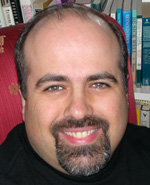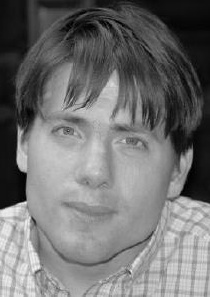Rafael Campo, “The Olive Grove”
How many centuries ago these trees
were planted is unknown, but some have guessed
the Romans planned these hilltop terraces.
The scowling faces in the bark agree
on nothing in their silent arguments,
except that they’ll bear fruit again, green globes
hard with their bitterness. The sunset glows
and sends long shadows stretching through their midst,akin to how I yearn for you—how old
is need, how tangled up in ancient knots.
You’ve wandered off from me, drawn by the scents
of lavender and jasmine on the cold
breeze rising up from where a garden pleads:
the olive grove’s grudged shelter seems betrayed.
 From The Enemy, the fifth collection of poems from Rafael Campo. Other Campo poems online include “The Distant Moon” (from the Academy of American Poets website), “Madonna and Child” (Slate, with audio), and “Living With Illness” and “The Blackouts” (The Cortlandt Review, with audio).
From The Enemy, the fifth collection of poems from Rafael Campo. Other Campo poems online include “The Distant Moon” (from the Academy of American Poets website), “Madonna and Child” (Slate, with audio), and “Living With Illness” and “The Blackouts” (The Cortlandt Review, with audio).
In an interview with Robert Birnbaum, Campo, who teaches and practices general internal medicine at Harvard, discusses his belief in the healing power of poetry: “There are many examples of language that biomedicine uses as a way, as a means of control and asserting its authority over those aspects of the illness experience that, quite frankly, we can’t control,” he says. “That’s where poetry, where narrative, where language really comes into its own as the indispensable instrument that it is. This moment where at the end of life, where another round of chemotherapy is just not going to do anything. Then that’s when the patient tells their story—where you hear it for the first time, if we are present. Most oncologists hightail it out of there because they don’t want to be around when someone is actually dying. Those are the moments where stories and poems have their greatest relevance to care providers and something we should pay more attention to in taking care of patients.”
27 January 2008 | poetry |
Paul Guest, “Nothing”
Between Buck Owens and Vivaldi what’s left
to listen to but the stars, so I do, dialing
the radio down to indeterminate static,
what I always thought was absence, an aria
of sizzling nothingness. Instead
it’s the Milky Way radiating arrhythmia
all the way back. It’s gossip
of the vacuum. That nothing has ever beentruly nothing is why I believe,
even still, in love. Beside two rivers
I have lived nearly all my life
and these beneath one sky
muttering its endless alphabet of sine waves.
Jupiter with its flock of moons
and the stone from which we hope
to squeeeze one drop of water,
red Mars pulsing in the blank field of night—I’ve wanted to leave Earth
behind, gravity’s orphan at last,
but not Earth with its two good seasons and two bad
and not its angel-winged clams
luminous in the mud bed of a river
so distant from me
I can’t remember where
that water is, except that I’ve dreamed it,
except that in it I sankall the way down.
 The Atlanta Journal-Constitution created a slideshow to Guest’s reading of “Nothing” on the occasion of his winning the Whiting Prize last November.
The Atlanta Journal-Constitution created a slideshow to Guest’s reading of “Nothing” on the occasion of his winning the Whiting Prize last November.
From Notes for My Body Double, the winner of the 2006 Prairie Schooner Book Prize for Poetry. Last week, Guest sold a new collection, to be called My Index of Slightly Horrifying Knowledge, to Ecco, along with a memoir, One More Theory of Happiness. “I am amazed and excited,” he says of the two-book deal. “[It] seemed like sci-fi, me who is used to contributor’s copies as payment. I was excited about an 80 dollar check the other day: lunch for the week! So I am still adjusting.”
Guest has appeared often at Verse Daily, and The Adirondack Review has published two of Guest’s poems online: “Notes For My Body Double” and “Pluto’s Loss.” From the Fishouse has an ample selection of Guest MP3s. Not to mention all the new work that shows up on his own blog.
26 January 2008 | poetry |

 Our Endless and Proper Work is my new book with Belt Publishing about starting (and sticking to) a productive writing practice.
Our Endless and Proper Work is my new book with Belt Publishing about starting (and sticking to) a productive writing practice. 
